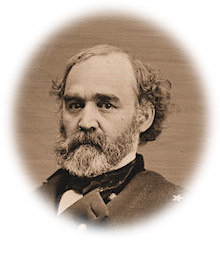U. S. TROOP-SHIP ATLANTIC,
Off Santa Rosa, April 20, 1861.
Col. H. BROWN, Commanding Department of Florida :
DEAR COLONEL: If my estimate is correct you have now about 690 men inside Fort Pickens. The Illinois is here with two companies, say 168. The Saint Louis has gone to order up two companies of infantry from Key West, say 154. You have then here 858; coming up, 154; total 1,012 The Sabine crew is 450. Powhatan 300; Brooklyn 300; Wyandotte, 75; total, 1,125. Crew of the Saint Louis, 250; Crusader, 100; Minnesota, 600; total, 950. Total force to be concentrated about Fort Pickens subject to your orders, 3,087.
The soldiers will have six months’ supplies as soon as the Illinois is discharged. Now, what to do with them? I agree with you in regard to the great importance of avoiding everything that will bring on a collision as long as possible. The policy of the Government I understand to be to hold, occupy, and possess what we now have, and not to produce collision if it can be avoided; in no case to fire the first hostile gun. The attack upon Fort Pickens must be made by bombardment or cannonade. I believe that it is impossible to land a force upon this island in face of the batteries of the Powhatan, Brooklyn, and Wyandotte, properly placed, without exposing it to sudden and swift destruction. If your men and means are all concentrated in Fort Pickens, every shell which enters the fort will tell its tale of destruction. To concentrate all these appears to me to be like putting the depot of a besieging army in the ricochet and breaching batteries. I think that the true mode of treating is that which regulates the advance batteries of a siege.
The sand hills of Santa Rosa afford good, well-protected bayous or approaches, along which material, men, horses, and artillery can be moved, properly protected from all direct and enfilading fire by works of very small extent, needed only to close a few gaps and to cut through a few ridges. An approach should be constructed across the open space at the foot of the glacis, and I think that a gallery through the glacis into the ditch may be advisable. I think that a gateway might be cut with advantage through the south entrance. I save the hauling of material and the hoisting of gun carriages over the ramparts. This gate, too, not being exposed to the direct fire of the opposing batteries, will not tempt an insubordinate, undisciplined volunteer to fire the shot which will open the war.
The three 10-inch mortars brought from Key West and some other pieces of artillery I think might be well placed in battery outside the fort. The division of these batteries will divide the enemy’s fire, and thus lessen its destructive effect. The mortars, being reserved to throw out light and fire balls from the fort, may be placed behind one of the sand ridges in position to bombard the navy-yard and its batteries. Here the mortar battery would be protected by the guns of Pickens. The light battery and a large portion, say two-thirds, of the garrison I think should be placed in an intrenched camp in the woods where the horses landed. Here they could be without the range of the batteries on the mainland. They would occupy then five miles of the island. A plank road, with natural epaulement on east side, would afford plenty of communication. This communication would be protected by the guns of the fleet, which should be moved in position, and which could destroy any enemy attempting to cut it off.
Vedettes and sentinels upon the ridge could keep up constant communication between the fort and the intrenched camp. Captain Barry will undertake it, as a boat expedition shall land in face of his guns. The working party and guard, detailed for twenty-four hours’ duty, should be kept in the fort to protect the provisions and ammunition there deposited, to work the guns, and repel a sudden assault should the enemy be rash enough to undertake one. The troops in camp and in fort would be healthy, not exposed to fire or too hard worked, and I think that all would be more cheerful, more comfortable, and more safe. The present crowded condition of the fort will, if it continues, bring on disease that in even a not crowded place will be destructive.
I have thrown these ideas, the fruit of much reflection upon this subject, together, colonel, for your consideration, and hope they will prove worthy of your approval and adoption. Upon you rests, of course, the responsibility which accompanies command, and I defer to your greater experience, rank, and responsibility, merely offering that advice which commends itself to my judgment.
I am, very truly, your friend and servant,
M. C. MEIGS,
Captain of Engineers.
You know that tents for 1,000 men should be on the Illinois; that 10,000 yards of canvas afford means to cover the horses from sun and insects, and that ample stores of lumber, ordnance, provisions, &c., are here or on their way.
